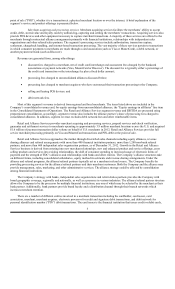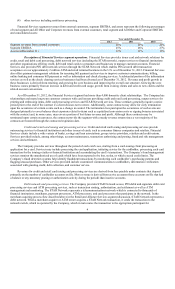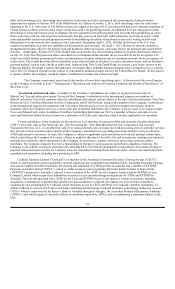First Data 2012 Annual Report Download - page 13
Download and view the complete annual report
Please find page 13 of the 2012 First Data annual report below. You can navigate through the pages in the report by either clicking on the pages listed below, or by using the keyword search tool below to find specific information within the annual report.
In the U.S., most states license money transmitters and issuers of payment instruments. Many states exercise authority over the
operations of the Company’ s services related to money transmission and payment instruments and, as part of this authority, subject the
Company to periodic examinations. Many states require, among other things, that proceeds from money transmission activity and
payment instrument sales be invested in high-quality marketable securities prior to the settlement of the transactions. Such licensing
laws also may cover matters such as regulatory approval of consumer forms, consumer disclosures and the filing of periodic reports by
the licensee, and require the licensee to demonstrate and maintain levels of net worth. Many states also require money transmitters,
issuers of payment instruments and their agents to comply with federal and/or state anti-money laundering laws and regulations.
Government agencies may impose new or additional rules on money transmission and sales of payment instruments, including
regulations which (i) impose additional identification, reporting or recordkeeping requirements; (ii) limit the entities capable of
providing the sale of payment instruments; and (iii) require additional consumer disclosures.
Escheat regulations. The Company is subject to unclaimed or abandoned property (escheat) laws in the U.S. and abroad which
require the Company to turn over to certain government authorities the property of others held by the Company that has been unclaimed
for a specified period of time such as, in the Integrated Payment Systems business, payment instruments that have not been presented
for payment or, in the Retail and Alliance Services segment, account balances that cannot be returned to a merchant following
discontinuation of its relationship with the Company. A number of the Company’ s subsidiaries hold property subject to escheat laws
and the Company has an ongoing program to comply with those laws. The Company is subject to audit by individual U.S. states with
regard to the Company’ s escheatment practices.
Other. Stored-value services offered to issuers by First Data Prepaid Services (“FDPS”) in the U.S., and by First Data’ s
International businesses (“First Data International”) outside the U.S. are subject to various federal, state and foreign laws and
regulations, which may include laws and regulations related to consumer and data protection, licensing, escheat, anti-money laundering,
banking, trade practices and competition and wage and employment. For example, the Credit Card Accountability Responsibility and
Disclosure Act of 2009 created new requirements applicable to general-use prepaid cards, store gift cards, and electronic gift
certificates effective August 22, 2010, and the Federal Reserve Board published on March 23, 2010 final rules to amend Regulation E
with respect to such cards and electronic certificates effective August 22, 2010. These laws and regulations are evolving, unclear and
sometimes inconsistent and subject to judicial and regulatory challenge and interpretation, and therefore the extent to which these laws
and rules have application to, and their impact on, FDPS, First Data International, financial institutions, merchants or others is in flux.
At this time the Company is unable to determine the impact that the clarification of these laws and their future interpretations, as well as
new laws, may have on FDPS, First Data International, financial institutions, merchants or others in a number of jurisdictions. These
services may also be subject to the rules and regulations of the various international, domestic and regional schemes, Networks and
Associations in which FDPS, First Data International and the card issuers participate. These schemes, Networks or Associations may,
generally in their discretion, modify these rules and regulations and such modifications could also impact FDPS, First Data
International, financial institutions, merchants and others.
In addition, the Housing Assistance Tax Act of 2008 included an amendment to the Internal Revenue Code that requires
information returns to be made for each calendar year by merchant acquiring entities and third-party settlement organizations with
respect to payments made in settlement of payment card transactions and third-party payment network transactions occurring in that
calendar year. This requirement to make information returns applies to returns for calendar years beginning after December 31, 2010.
Reportable transactions are also subject to backup withholding requirements. The Company could be liable for penalties if it is not in
compliance with these regulations.
13
























